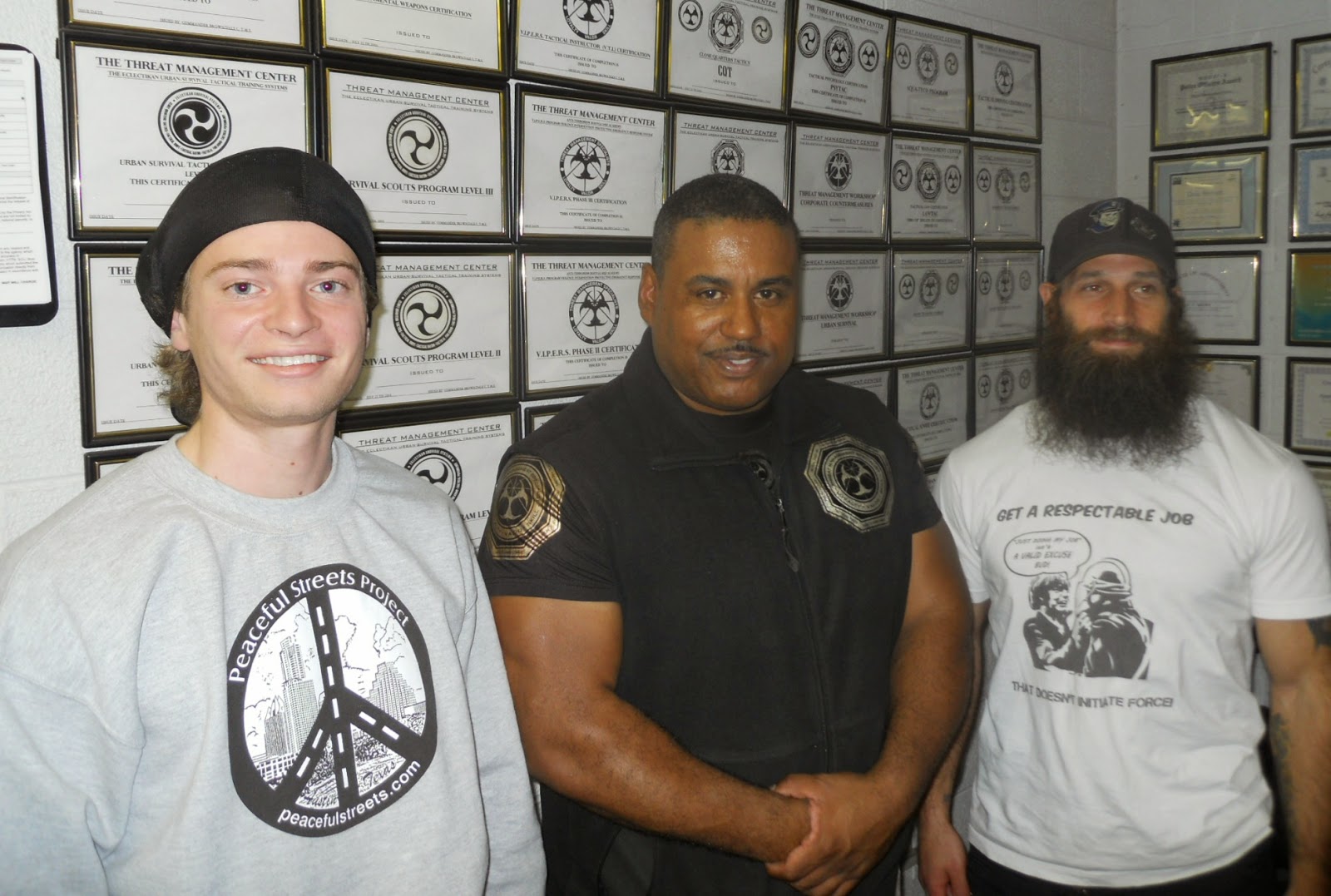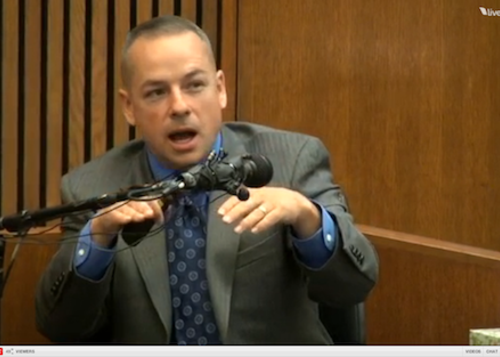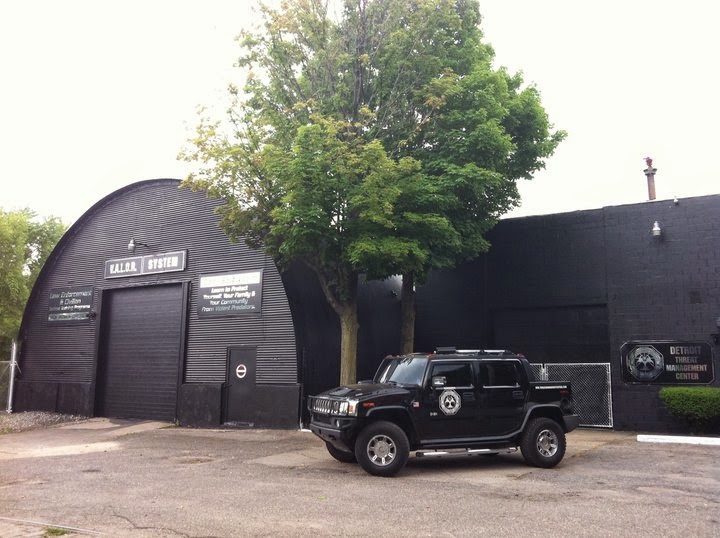 |
| Dale Brown (center) with Garrett Ean and Pete Eyre. |
|"How
would things be different,” muses Dale Brown of the Detroit-based Threat Management
Center, “if police officers were given financial rewards and commendations
for resolving dangerous situations peacefully, rather than for using force in
situations where it’s neither justified nor effective?”
Brown’s
approach to public safety is “precisely the opposite of what police are trained
and expected to do,” says the 44-year-old entrepreneur. The TMC eschews the “prosecutorial philosophy
of applied violence” and the officer safety uber
alles mindset that characterize government law enforcement agencies. This
is because his very successful private security company has an entirely
different mission – the protection of persons and property, rather than
enforcing the will of the political class. Those contrasting approaches are displayed to
great advantage in proto-dystopian Detroit.
“We’ve
been hired by three of the most upscale neighborhoods in Detroit to provide
24/7 security services,” Brown proudly informed me during a telephone
interview. “People who are well-off are very willing to pay for Lamborghini-quality
security services, which means that our profit margin allows us to provide free
services to people who are poor, threatened, and desperate for the kind of help
the police won’t provide.”
“Unlike the police, we don’t respond after a crime has been committed to conduct an investigation and – some of the time, at least – arrest a suspect,” Brown elaborates. “Our approach is based on deterrence and prevention. Where prevention fails, our personnel are trained in a variety of skills – both psychological and physical – to dominate aggressors without killing them.”
Police typically define their role in terms of what they are permitted to do to people, rather than what they are required to do for them. Brown's organization does exactly the reverse, even when dealing with suspected criminals.
“Unlike the police, we don’t respond after a crime has been committed to conduct an investigation and – some of the time, at least – arrest a suspect,” Brown elaborates. “Our approach is based on deterrence and prevention. Where prevention fails, our personnel are trained in a variety of skills – both psychological and physical – to dominate aggressors without killing them.”
Police typically define their role in terms of what they are permitted to do to people, rather than what they are required to do for them. Brown's organization does exactly the reverse, even when dealing with suspected criminals.
To
illustrate, Brown refers to an incident from a security patrol in which he
encountered a black teenager “who was walking in a neighborhood at about 3:00
a.m. dressed in a black hooded sweatshirt, doing what is sometimes called `the
drift’ – it was pretty clear he was up to something.”
Rather
than calling the police – who, given their typical four-hour response
time, wouldn’t have arrived soon enough to be of any help, as if helping
were part of their job description – Brown took action that was both preventive
and non-aggressive.
“I
told him, `There are criminals here who might rob you, so you’ll get free
bodyguard service anytime you’re in the neighborhood,’” Brown related to me. “I
also asked for his name and personal information for a `Good person file’ that
would clear him with the cops next time he decided to go jogging in a black
hoodie a three in the morning. He didn’t have to give me that information, of
course, but he told me what I needed to know – and we’ve never seen him there
again.”
Brown
and his associates take a similar approach to dealing with minor problems that
usually result in police citations that clog court dockets and blight the lives
of harmless people.
“When
we see someone who is drunk or otherwise intoxicated, we offer to take their
keys and call their families to get them home,” he reports. “This way we keep
them safe from harm – and, just as importantly, protect them from prosecution.
Again, everything we do is the opposite of what the police do. If you have a
joint in your pocket, the cops will be all over you – but if you’re facing actual
danger, they’re nowhere to be found, and aren’t required to help you even if
they show up.”
That
contrast is most visible in confrontations with potentially dangerous people.
Brown’s company receives referrals to provide security for people who face
active threats, such as victims of domestic violence. One representative case
involved a young mother whose
daughter had been abducted by a violent, abusive father with a lengthy criminal
history.
The child was rescued and reunited with her mother without guns being drawn or
anybody being hurt.
For
reasons of accountability and what the private sector calls “quality
assurance,” Brown and his colleagues recorded that operation, as they document
nearly everything else they do. However, they weren’t playing to the cameras.
The same can’t be said of the Detroit PD SWAT team that stormed the home of 7-year-old
Aiyana Stanley-Jones at midnight in May 2010 while filming the assault for a
cable television program.
Officer
Joseph Weekley, who burst through
the door carrying a ballistic shield and an MP5 submachine gun, shot and killed
Aiyana, who had been sleeping on the living room couch. By the time she was
killed terrified little girl had already been burned by a flash-bang grenade
that had been hurled into the living room.
The
home was surrounded with toys and other indicia that children resided therein,
and neighbors had pleaded with the police not to carry out the blitzkrieg. The
cops did arrest a suspect in a fatal shooting, but he resided in a different
section of the same building. In any case, the suspect could have been taken
into custody without a telegenic paramilitary assault – if the safety of those
on the receiving end of police violence had been factored into the SWAT team’s
calculations.
Owing in no small measure to public outrage, Weekly has been
charged with involuntary manslaughter and careless discharge of a weapon
resulting in death. A jury deadlocked on the charges in July 2013. Weekley
now faces a second trial that will produce a conviction only if
the prosecution can overcome the presumption that the officer’s use of deadly
force was reasonable. This is
a function of the entirely spurious, and endlessly destructive, doctrine of “qualified
immunity,” which protects police officers from personal liability when their
actions result in unjustified harm to the persons or property of innocent
people.
The
rationale behind qualified immunity is the belief that absent such
protection competent and talented people wouldn’t enlist as peace officers. In
practice, however, qualified immunity merely emboldens incompetent and vicious
police officers.
“Police should be subject to exactly the same laws and
liabilities that the rest of us face,” contends Brown. “If we don’t have
perfect reciprocity, then police should be held to a higher standard of
accountability than the rest of the citizenry. If they commit criminal acts
that result in injury or death, police should do double the time that a
`civilian’ would face, because they’re supposed to be professionals.”
As private sector professionals, Brown observes, “we have
double accountability – first to our clients who pay us, and then to the
criminal justice system and civil courts if we do something wrong. And because
the police usually see us as competitors, they are very eager to come after us
if we screw up. But in all the years we’ve been working, we’ve had no deaths or
injuries – either to our clients or to our own people – no criminal charges,
and no lawsuits.”
Not only do Brown and his associates operate without the
benefit of “qualified immunity,” they are required to expose themselves to
physical risk on behalf of their clients – something that police are trained to
avoid.
“For
police officers, going home at the end of the shift is the highest priority,”
Brown observes. “For us it can’t be. When we’re hired to protect a client, his
home, his business, his family, we’ve made a choice to put the client’s safety
above our own, and to make sure that he or she gets home safely at the end of
the day.”
When
people seek help from the police, Brown points out, they’re inviting
intervention by someone who has no enforceable duty to protect them, but will
be rewarded for injuring them or needlessly complicating their lives.
“Let’s
examine this logically,” Brown begins. “What is this human being – the police
officer – going to get out of becoming involved in your troubles? Will be he
rewarded for helping you to solve them, especially if this involves a personal
risk? Would solving your problem be worth getting injured or killed?”
“We’re dealing with a basic question of human motivations,”
Brown continues. “Police are not required to intervene to protect you – there
is a very long list of judicial precedents proving this. They’re actually
rewarded for not intervening. Here,
once again, I emphasize that Threat Management is not comparable to the police.
We follow exactly the opposite approach. People don’t have to work with Threat
Management, but if they choose to, that’s what we expect of them.”
Some critics of TMC and other private security firms insist
that their personnel cannot match the qualifications and experience of
government-employed police officers. That objection wildly overestimates the
professional standards that must be met in order for an individual to become a
government-licensed purveyor of privileged violence.
“An individual can become a police officer in six months,”
Brown points out. “Can you become a doctor or an EMT in six months? Is there
any other profession in which employees can become `qualified’ to make
life-and-death decisions on behalf of other people after just a few months of
training?”
By way of supplementing Brown’s point: In Arkansas, an
applicant can become a police officer in a day, and work in that capacity for a
year, without professional certification of any kind. However, to become a licensed practicing cosmetologist, an applicant
must pass a state board examination and complete 2,000 hours of specialized
training. For an investment of 600 hours an applicant can qualify to work as a
manicurist or instructor.
While Arkansas
strictly regulates those who cut hair or paint nails in private, voluntary
transactions, it imposes no training or licensing standards whatsoever on armed
people who claim the authority to inflict lethal violence on others. This is
not to concede that there is any way one human being can become legitimately “qualified”
to commit aggressive violence against another.
“Law enforcement
attracts a certain personality type that is prone to narcissism and
aggression,” Brown asserts, speaking from decades of experience. “People like
that get weeded out from our program very early. We protect innocent people
from predators, and we can’t carry out that mission by hiring people who are
predatory themselves. Our people receive extensive training in firearms and
unarmed combat techniques, but they’re also taught to look at all humans as
members of the same family. The question we want them to ask themselves is – in
what circumstances would you shoot, or otherwise harm a member of your family? They’re
trained to apply that standard in all situations involving a potential use of
force. People who can’t think that way aren’t going to fit in with our
program.”
Brown emphatically
agrees that the phenomenon called “police militarization” is a huge and growing
menace, but insists that the core problem is “not the military hardware, or the
other trappings of militarization, but the system itself. Police agencies
attract the wrong kind of people and then tell them, `You’re like God’ – they get
to impose their will on others and use lethal force at their discretion. And
when someone
who is really golden
shows up – that is, an
ethical, conscientious person who wants to protect the public – they get
redirected into a role that will minimize their influence for good by people
who are worried about their own job security.”
“Ideally, the best
approach would be to abolish the current system and start over,” Brown
concludes. “But the very least we should demand would be total equity and
complete accountability – which would mean, as a starting point, doing away
with this idea of `qualified immunity.’ Police are citizens, and they should be
governed by the same laws that apply to all citizens. No exceptions, no special
protections.”
Several studies have shown that there
are between three and four times as many private peace officers – such as
security guards, armored truck drivers, and private investigators – as sworn
law enforcement officers in the United States. That fact demonstrates
that the security market is completely
unserved by government law enforcement agencies. This shouldn’t be surprising,
since – as
I have observed before – police agencies serve the interests of those who
plunder private property, and thus can’t be expected to protect it.
Police personnel practice aggressive violence from the
shelter of “qualified immunity.” The absence of such protection doesn’t deter
talented, motivated people such as Dale Brown and his associates – and others
providing similar services in Houston, Oakland,
and elsewhere -- from seeking employment as private security officers who
actually accept personal risk to protect property.
Why not abolish qualified immunity for all security personnel? Critics of that proposal might protest that
this would undermine the state’s monopoly on the provision of “security” by requiring
its employees to compete on equal terms with the private sector. Which is
precisely the point.





15 comments:
Watch the state - which loathes competition of any kind - shut him down.
Reminds me of the Gaurdian Angels.
Agreed it won't be long before the tyrannical government deems his outfit and others like it, terrorist groups to be annihilated.
Great article! It's super easy to point out the overwhelming failures of our current system, which is tremendous. It's much more difficult, however, to provide working alternatives to the current standard. A standard that must never consider questioning for lack of another option. Way to be a part of the solution!
This may be the best article of Mr. Griggs that I've read yet, and that's high praise indeed! I'm more of a minarchist than an anarchist, but a common objection raised by those who would oppose libertarian philosophy is their perceived necessity of state-run police. Glad to know that somebody out there has figured out an alternative.
The difference between Peace Officers (the private security) and the LEOS (wealth distribution statists)
B Woodman
III-per
I too would say this is your greatest article but that would be unfair to all your other fantastic work. What this is is your most encouraging article, the article that gives us the greatest hope that free enterprise security can establish itself and demonstrate its great superiority to 'security' provisioned by a political elite. In fact Will, given your background early on in security one cannot help himself from suggesting that you are the ideally suited, knowledgeable and entrepreneurial individual to
work with outstanding private enterprise security like Dale Browns in order to franchise them, to get them all over the country so that subscribing to private security becomes as commonplace as subscribing to cell phone service.
erinee, solutions are as simple as "let the market decide" to the slightly more complex treaties
found on other great sites as striketheroot and Mises institute.
If you doubt that statement i invite you to post your concerns
and review the replies/responses
that are usually most abundant.
Well seems the incompetence of the system is being pointed out. They won't like this one bit but who the fuck cares.
Im amazed and pleased how this private security handles things in a peaceful manner and trains its personnel extensively. They might use force but only if said perp gives them no choice as in absolute last resort which thankfully does not happen often.
while the police today takes the approach of put more boots on the ground aka numbers over skill which is not working and it allows some horrific people to get in.
nice article and congrats that private security firm.
This will never happen in our country. To much tax money that government spends for this type of control.
To Mike Alford: Will had it "figured out" a long time ago (as far as I can tell). When are YOU gonna figure it out, Mr. Minarchist? When Leviathan is allowed even a toe in the door, it will soon be sitting on your head! Only when Leviathan is eliminated in total (anarchy) will we not have it busting through our doors and sitting on our heads! The vaunted parchment of amerikan limited government was allegedly (ahem!) supposed to restrict Leviathan at essentially minarchistic levels . . . see how well Leviathan likes being being "limited"? NOT! Keep going Mike; I think you'll get there.
God job Will,
Keep it up.
This is great I hope and pray that this continues on. I would also like to know their face book so I can add them , what are their names are they the vipers? Our another group. I love this and how their are some in California southern parts. I would like to be party of this. They sound like the real common law peace keepers
I'm pretty moderate in my libertarianism. I'm skeptical of state police, but I struggle to see a clear systematic reason why private police would be immune to the abuses.
A "true" libertarian friend sent me this article, and I'm really impressed to see some great policing being done by a private company. I'm left wondering what is special about "Threat Management Center".
What makes them get things so right? Is it simply the fact that they don't get paid with tax dollars? Would removing "qualified immunity" from a state police force improve the quality of policing? Does state law enforcement play an important part in keeping private police forces accountable?
The chief advantage to a private security company like TMC is precisely the fact that they do not consider themselves to be "special." They cannot initiate force to compel compliance; they can only use force defensively. And when they do so, they are fully liable, both criminally and civilly, for any abuses they might commit. Unlike government law enforcement personnel, TMC employees and other private security personnel cannot take refuge in the spurious doctrine of "qualified immunity," as you point out.
Trite as it may seem, I'm reminded of the film "Paul Blart: Mall Cop," which -- silly as it was -- actually offers a very good (albeit cartoonishly over-the-top) illustration of the difference between law enforcers and peace officers, the latter of whom are dedicated to protecting property, commerce, and innocent lives.
Post a Comment